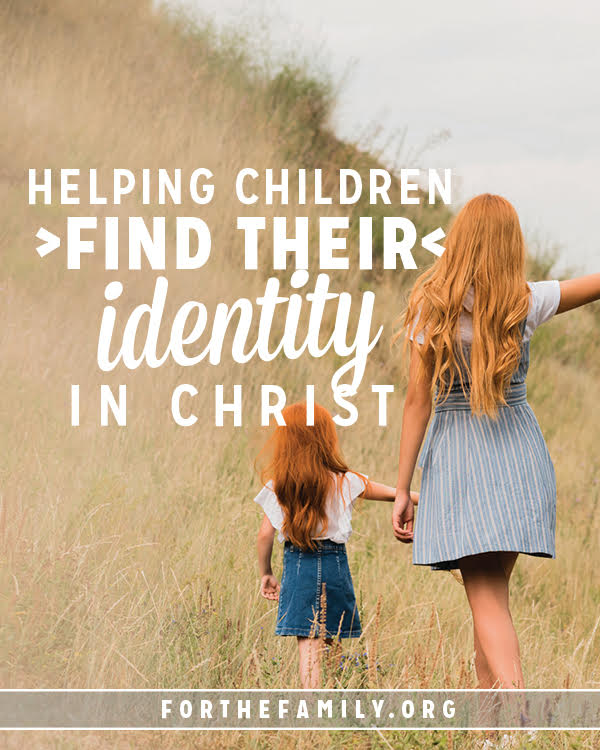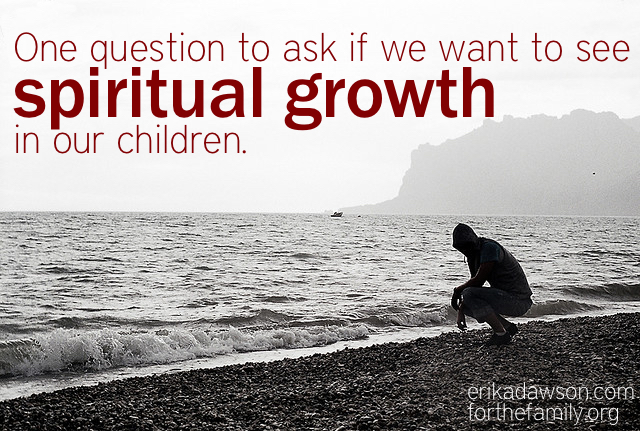Helping Children Find Their Identity in Christ
 There are many voices that speak into our children’s hearts, telling them who they are and what they should be: teachers, friends, social media, television, professional athletes, and culture in general. Not to mention, our own voices as parents.
There are many voices that speak into our children’s hearts, telling them who they are and what they should be: teachers, friends, social media, television, professional athletes, and culture in general. Not to mention, our own voices as parents.
Our children hear these voices. They hear the messages. And they use these messages to shape their identity, who they are and how they define themselves.
What are some of those identities?
“I am an athlete.”
“I am slow and useless.”
“I am beautiful.”
“I am fat and ugly.”
“I am smart.”
“I am dumb.”
“I am funny.”
“I’m a troublemaker.”
“I am creative.”
Some of these statements seem innocent, harmless even. Others are obviously negative. For the identities that seem harmless—what happens when such identities are challenged? What happens when the athlete is injured and can no longer play? What happens when the smart child doesn’t ace a test or fails to get into the school they’ve worked so hard to get into? What happens when someone prettier or funnier comes along? And for the child with an already negative identity, how does it follow them into adulthood?
When a child forms their identity around their abilities or lack thereof, their behavior, or how they look, eventually that identity will fail them. Such an identity can become an idol for some, a stumbling block for others, and the thing that damages the heart of others.
Because any identity grounded on something apart from Christ is like the proverbial house built on shifting sand.
For believers, we need to speak truth into our child’s heart and help them filter through the voices they hear. We need to show them their identity is not based on what they can do, how they look, what other people think of them, but of who they are as a child of God.
IMAGE BEARERS
When God spoke the world into being, he created all things. On the sixth day, God created mankind. “Then God said, “Let us make man in our image, after our likeness. And let them have dominion over the fish of the sea and over the birds of the heavens and over the livestock and over all the earth and over every creeping thing that creeps on the earth.” So God created man in his own image, in the image of God he created him; male and female he created them” (Genesis 1:26-27).
We were created as image bearers.
Out of all the things that God made, only humans bear God’s image. This doesn’t mean that we look like him in the physical way that our children look like us because God is a spirit and doesn’t have a body like we do. However, we do image him in his communicable characteristics. We are thinking and feeling beings. We have rational thought and can logically think through problems to find solutions. We have the ability to form relationships with others and love them. As the Genesis passage tells us, as image bearers, we have dominion over the created world. In this way, we represent God, demonstrating authority over the plants and animals. Like God, we are also creative, expressing ourselves in all forms of art. And most importantly, we were made to commune with and have a relationship with our Heavenly Father.
An image bearer images the original, therefore we image the original—God. We reflect Him. We point to Him. We mirror Him. When we look up at the moon in the night sky, it provides us light to see, especially when it’s a full moon. Yet the moon has no light of its own. It merely reflects the light of the sun. That’s what we do as image bearers, we reflect who God is. We image him in how we work, rest, love, think, and create. And as image bearers, our purpose is to bring honor and glory to the One who created us (see 1 Corinthians 10:31).
Our children are valuable and precious because they are image bearers of their Creator. As Psalm 139 tells us, “For you formed my inward parts; you knitted me together in my mother’s womb. I praise you, for I am fearfully and wonderfully made. Wonderful are your works;
my soul knows it very well.” Our children have worth, not because of what other people think of them or how good they are at something, but because they are God’s children.
REDEEMED TO IMAGE CHRIST
But Genesis 1 isn’t the whole story. Genesis 3 tells us that something happened to us as image bearers. When Adam and Eve sinned, all humanity fell into sin. Instead of reflecting the God who made them, people instead live for their own praise, honor, and glory. Sin has saturated all of creation, marring the image of God in all of us. We hurt other image bearers in our words and actions. We fail to image God in our decisions, relationships, and our work. That is why Jesus came, to redeem us from sin and make us new creations—to remake us to reflect and image Christ.
As we tell our children the story of who they are—as image bearers created to bring God glory—we must also tell them the gospel: that through Jesus, through faith in what he did for us at the cross, we are made new. The gospel tells us that Christ lived a perfect life we could not live. For those who trust in Christ by faith, God looks at us and sees Christ’s righteousness and not our sin. He has forgiven us our sins and cleansed us. We are new creations who can now live for his glory, imaging him to the world around us. In Christ, we are redeemed, cleansed, forgiven, and worthy. Unlike how the world treats us, God doesn’t love us based on what we look like or what we can do, but because of his great love for us in Christ.
So when our children read or watch or hear from the world stories of what they should be or are told who they are based on what they look like or how they act, we need to tell them a different story. While they might be good at certain things, it’s not who they are. Likewise, they may struggle and stumble in certain things, but it’s not who they are.They are image bearers, precious in the sight of God, made to reflect him to the world around us. And by faith in what Christ has done, they are forgiven of sin and are being remade into people who image their Savior.
Blessings,
Christina Fox







Our children’s discovering their identity in Christ is as much becoming aware of their true created nature as it is an establishment of communion with God. This discovery, so essential for entry into sainthood, is the revelation of their true identity, enabled by the vision of God, which is imparted when we assume the same state of consummate vulnerability to Him as Jesus lived for the entirety of His life. That vision, once imparted to each child so disposed by God (or any adult for that matter), in time becomes so utterly compelling that taking upon themselves the communion with God which is always required of entry into Heaven, becomes irresistible to them. There is a deception which even Christians frequently seem to propagate even among ourselves which is that God is in some manner distant from us and that distance is somehow OK even though the thought of such a distance in Heaven is ludicrous. In fact, God is so intimately near to each of us that even our marriages utterly pale in comparison. Our absolute nearness to God arises from the fact that each of us was created by Him out of Himself. We are made of the same stuff as our God and as a result our recognition enabled by the vision of Him compels a bond with Him which is all but irresistible if we allow. Our nature is simply that of our Creator and when our children are encouraged to allow that scriptural vulnerability to God within themselves initiating within them the same recognition of God imparted to the first Christians, communion with God becomes established because human beings so disposed to God simply cannot want to resist life in His presence. If you want to understand why so many dying churches fail in their one true mission, it is because for decades they have spurned genuine and consummate personal vulnerability to God. As you can surmise, this is not the encouragement of mere good behavior or even our version of obedience to God.
It is stated above that Jesus came to remake us and our children to reflect and image Christ and so He did. Many think of their “remaking, as I once did, as the process by which we become more well behaved and obedient individuals, more like God if you would, hoping ultimately to become worthy of Heaven. Many rude awakenings finally convicted me that I will never be worthy of Heaven and could never be. What I believed were the elements of my worthiness of Heaven, if they were genuinely that at all, could only have been the result of what really enabled my sainthood, the communion with God established for our race and reestablished by God in the sacrifice of Jesus. Because of that sacrifice, we have entered into the sonship of Jesus with respect to our Father and are recognized not by the guilt of our sin but by our entry into the selfless communion with Him of His Son. It is the expectation of our entry into the sonship of Jesus that as parents we are charged to impart to our children. teaching them that we are not works in progress but by the blood of Jesus, entirely God’s own, restored to the sanctity of our first parents before their rebellion and fall from grace. We must teach our children that being the image of Christ is not like being a duplication or picture of Him and that the true image of God that we portray was always intended to be the embodiment of Him as Jesus promised if they are willing to embrace becoming vessels of God as He encouraged. In our children’s becoming the embodiment of our Savior, they no are no longer constrained to “reflect” Christ because He lives within them and radiates from within them as well.